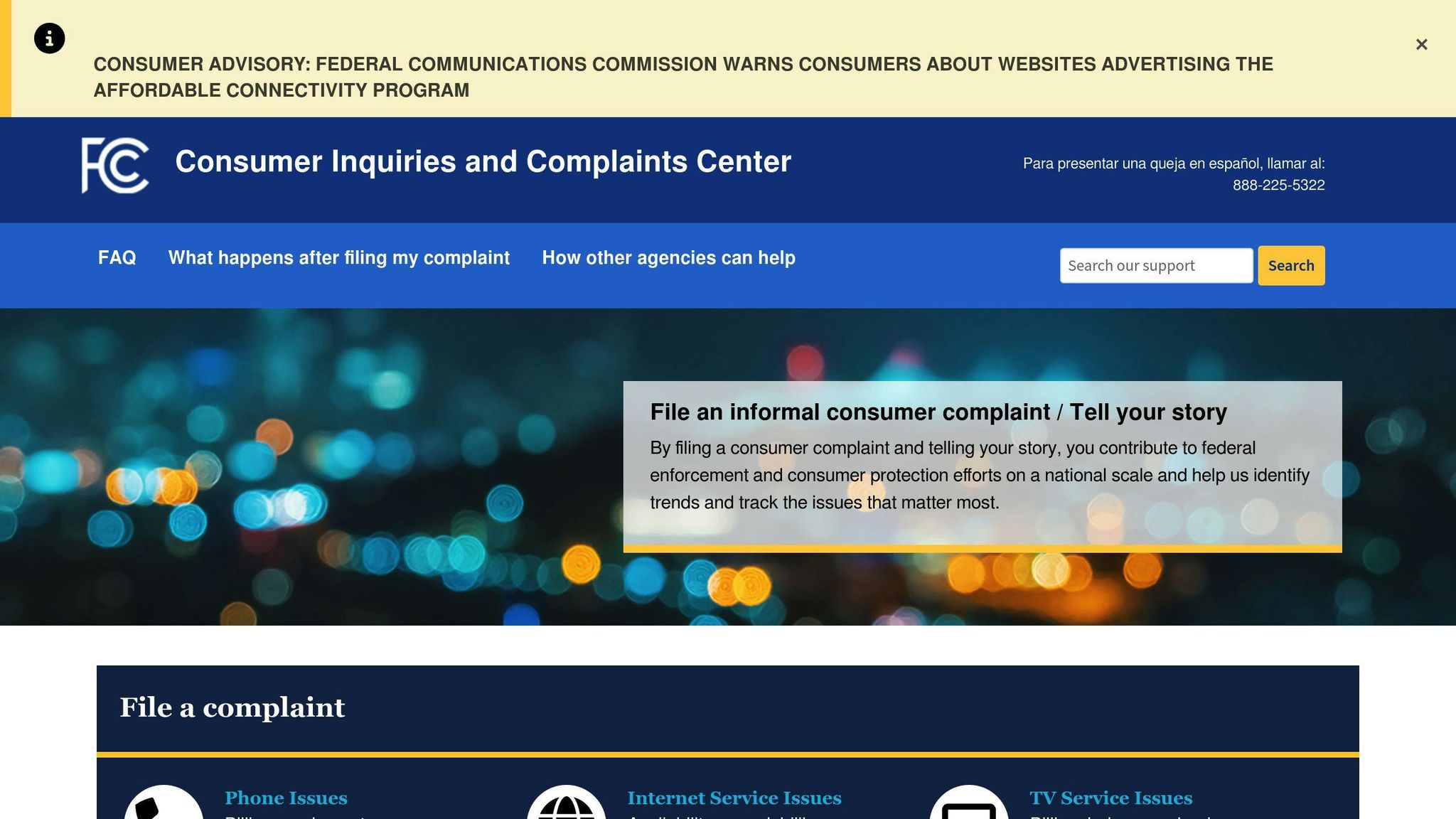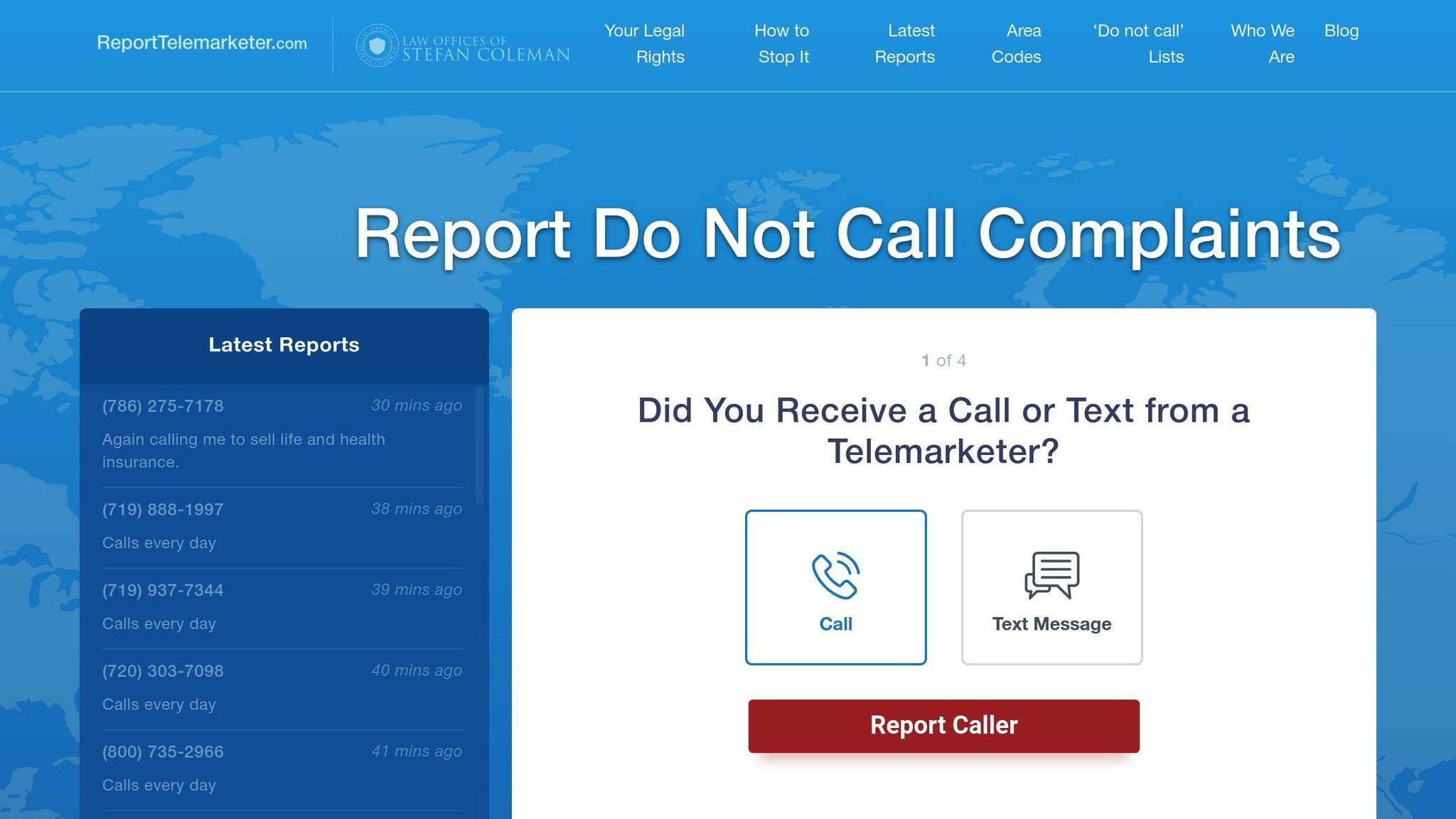
Unwanted telemarketing calls are frustrating, but knowing where to report them can help. The FCC and FTC both handle telemarketing complaints, but their roles differ:
- FCC: Handles technical issues like robocalls, caller ID spoofing, and spam texts.
- FTC: Focuses on scams, fraud, and violations of the Do Not Call Registry.
For robocalls involving scams, report to both agencies for better results. Here’s a quick comparison:
| Agency | Handles | How to Report |
|---|---|---|
| FCC | Robocalls, spoofing, spam texts | fcc.gov/complaints or 1-888-CALL-FCC |
| FTC | Scams, fraud, Do Not Call violations | donotcall.gov or 1-877-FTC-HELP |
Provide details like the caller’s number, time, and call content when filing a complaint. Tools like ReportTelemarketer.com can also assist by investigating and taking legal action on your behalf.
FCC and FTC: What Do They Do?

FCC: Overseeing Telecommunication Rules
The FCC enforces the Telephone Consumer Protection Act (TCPA), ensuring compliance with telemarketing rules. This includes enforcing call time limits (8 am–9 pm), requiring consent for robocalls, and ensuring opt-out options are available . Recently, the FCC has also taken steps to address evolving robocall technologies and related threats.
FTC: Safeguarding Consumers from Telemarketing Scams
The FTC works to protect consumers from unethical telemarketing practices. Their main responsibilities include:
- Managing and enforcing the National Do Not Call Registry
- Regulating sales practices under the Telemarketing Sales Rule (TSR)
- Investigating and taking legal action against deceptive telemarketing and scams
The FTC actively monitors telemarketing activities, investigates violations, and pursues legal cases against companies that breach consumer protection laws .
How to Report Fraud at ReportFraud.ftc.gov
What Complaints Do the FCC and FTC Handle?
Filing your complaint with the right agency ensures it’s addressed properly and increases the chances of a timely resolution. The FCC and FTC handle different types of telemarketing violations, each focusing on specific areas of consumer protection.
Complaints the FCC Handles
The FCC deals with technical and procedural violations, such as:
- Robocalls and AI-Generated Calls: These are illegal without prior consent, as outlined in the TCPA.
- Caller ID Spoofing: When telemarketers fake their identity to mislead recipients.
- Spam Text Messages and TCPA Violations: Includes unauthorized commercial texts, calls outside the permitted hours (8 AM–9 PM), and prerecorded messages sent without consent.
Complaints the FTC Handles
The FTC focuses on protecting consumers from fraudulent and deceptive practices, including:
| Type of Violation | Examples |
|---|---|
| Do Not Call Registry Violations | Telemarketers contacting numbers listed on the registry. |
| Fraudulent or Deceptive Practices | Impersonating IRS agents or government officials, false prize claims, or misrepresented products/services. |
| TSR Violations | Failing to disclose important terms or conditions. |
In cases where violations overlap – such as receiving a robocall (FCC jurisdiction) that involves a fraudulent scheme (FTC jurisdiction) – filing complaints with both agencies ensures a more thorough investigation.
Knowing which agency to approach is the first step toward taking effective action against telemarketing violations.
How to File a Telemarketing Complaint
Filing a telemarketing complaint depends on whether you’re reporting to the FCC or the FTC. Each agency has its own methods for handling these issues.
Filing a Complaint with the FCC
The FCC offers three ways to report telemarketing violations:
- Online: Go to fcc.gov/complaints, choose the phone complaint form, and fill in details like your contact information, when the call occurred, and what it was about.
- Phone: Dial 1-888-CALL-FCC (1-888-225-5322) to report directly.
- Mail: Send a written complaint to the FCC’s Consumer and Governmental Affairs Bureau.
Filing a Complaint with the FTC
The FTC focuses on violations of the Do Not Call Registry and telemarketing scams. You can report these issues through:
- Online: Submit your complaint at donotcall.gov.
- Phone: Call 1-877-FTC-HELP (1-877-382-4357).
- Do Not Call Registry: You can also register your number at donotcall.gov to reduce unwanted calls.
Information to Include in Your Complaint
Whether you’re reporting to the FCC or FTC, make sure to provide:
- The date and time of the calls.
- The phone number displayed on your caller ID.
- Details about the call, including its content and any rules it may have broken.
- Recordings or voicemails, if available, to support your complaint.
If dealing with repeat offenders or more complex situations, you might consider using services like ReportTelemarketer.com, which can handle investigations and file complaints on your behalf.
Both agencies make it easy to report issues, but their processes and the outcomes can vary. We’ll dive into those differences next.
sbb-itb-a8d93e1
Comparing FCC and FTC Complaint Processes
Understanding how the FCC and FTC handle complaints can help consumers report telemarketers more effectively.
The FCC uses complaints to shape policies, while the FTC focuses on investigating and enforcing consumer protection laws.
Differences in Procedures and Results
| Aspect | FCC | FTC |
|---|---|---|
| Primary Focus | Telecommunications violations, unwanted calls/texts, TCPA compliance | Telemarketing scams, Do Not Call Registry violations, deceptive practices |
| Investigation Process | Guides policy and regulatory actions based on complaints | Investigates individual cases and patterns of fraud |
| Response Time | No individual resolution | May request more details or provide updates |
| Enforcement Actions | Issues fines for TCPA violations, particularly robocall infractions | Files lawsuits, issues cease and desist orders, works with law enforcement |
| Follow-up Process | Provides a tracking number but rarely offers individual updates | May provide updates and request additional documentation |
The FCC recently addressed robocall technology in its AI ruling, reflecting its focus on tackling modern challenges. Meanwhile, the FTC builds cases against repeat offenders, investigates scams, and collaborates with state authorities.
Here’s how to decide where to file your complaint:
- FCC: Report unauthorized robocalls, calls to wireless phones without consent, or violations of calling time restrictions.
- FTC: Report scam calls, breaches of the Do Not Call Registry, or deceptive telemarketing practices.
Both agencies work together to address regulatory gaps and improve telemarketing protections. Additionally, tools like ReportTelemarketer.com can simplify the process and support enforcement efforts.
Other Tools for Reporting Telemarketing Issues
In addition to the FCC and FTC, platforms like ReportTelemarketer.com provide extra support for addressing telemarketing violations.
ReportTelemarketer.com: A Free Reporting Platform

ReportTelemarketer.com offers a straightforward way to report telemarketing violations and take action against offenders. Here’s a quick look at what it provides:
| Feature | What It Does |
|---|---|
| Investigation Services | Utilizes specialized tools to uncover violations and collect evidence |
| Legal Action | Sends cease-and-desist letters and files formal complaints for users |
| Cost Structure | Free for consumers, with legal fees recovered from violators |
| Integration | Complements FCC and FTC complaints for better results |
| Privacy Protection | Keeps user data secure while exposing violators publicly |
Founded by Stefan Coleman, ReportTelemarketer.com handles the entire process – from investigating complaints to taking legal action – without charging consumers. The process is simple: users report unwanted calls, the platform investigates, and actions are taken to stop the violations.
Unlike passive tools that only block calls, ReportTelemarketer.com actively investigates and pursues legal action. This makes it especially useful for dealing with telemarketers who ignore the Do Not Call Registry.
Providing accurate details about telemarketing calls strengthens the platform’s ability to investigate and take action. By combining resources like ReportTelemarketer.com with FCC and FTC tools, consumers can more effectively combat telemarketing violations.
Deciding Where to Report Telemarketing Violations
Understanding where to report telemarketing violations is crucial for ensuring the right action is taken. The FCC handles technical issues like robocalls and spoofing, while the FTC focuses on fraud and deceptive marketing practices.
| Violation Type | Where to Report | Why This Agency Handles It |
|---|---|---|
| Robocalls & Spoofing | FCC | Enforces telecommunication rules and TCPA violations |
| Sales Scams & Fraud | FTC | Focuses on consumer protection and deceptive practices |
| Do Not Call Violations | Both FCC & FTC | Jointly oversee the National Do Not Call Registry |
| Automated Messages | FCC | Regulates prerecorded voice messages |
| Deceptive Marketing | FTC | Ensures compliance with the Telemarketing Sales Rule |
For cases that overlap – like fraudulent robocalls – it’s often a good idea to report to both agencies.
The FCC primarily targets technical violations. As Kati Daffan, an attorney at the Federal Trade Commission, explains:
"If you hear a sales robocall without prior written consent, it’s illegal."
The FTC, on the other hand, focuses on consumer protection. While the FCC collects data for broader investigations, the FTC aims to resolve individual complaints, often within 30 days.
When filing a complaint:
- Document details like the date, time, and caller ID
- Clearly describe the type of violation
- Consider reporting to both agencies if the issue involves both technical and fraudulent elements
Filing complaints through the FCC’s online portal is free and straightforward. Pairing these official channels with tools like ReportTelemarketer.com can help build a stronger defense against unwanted calls. The key is identifying the agency best equipped to handle your specific issue.
FAQs
Here are answers to some common questions about filing telemarketing complaints and the roles of the FCC and FTC:
Does filing a complaint with the FCC make a difference?
Filing a complaint helps the FCC track patterns of violations and refine telemarketing rules. While individual cases might not be resolved directly, the information supports investigations and discourages companies from breaking FCC rules.
Which federal agency oversees telemarketing?
Both the FCC and FTC are involved. The FCC handles technical issues, while the FTC focuses on fraud and protecting consumers.
How do I file a complaint with the FCC about telemarketers?
You can submit complaints through the FCC’s website at fcc.gov/complaints or call 1-888-CALL-FCC (1-888-225-5322).
What laws restrict telemarketers from contacting people?
The Telephone Consumer Protection Act (TCPA) limits telemarketing without prior consent, including robocalls and automated messages.
How can I report robocalls to the FTC?
You can report robocalls to the FTC online at ftc.gov/robocalls or by calling 1-877-FTC-HELP. Be sure to include details like the caller’s number and the date of the call. The FTC uses these reports to investigate and take action against violators.